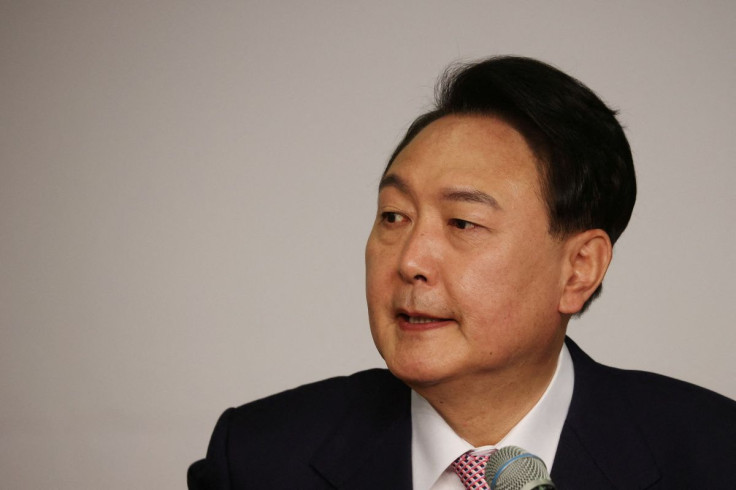S. Korea’s President-elect Yoon Suk-yeol Hints At Joining QUAD, If Invited

Dumping a foreign policy that has consistently played an intricate balancing act between the U.S., with whom it has a military pact, and China, its leading trading partner, South Korean President-elect Yoon Suk-yeol has hinted at joining the Quadrilateral Security Dialogue (QUAD), if invited.
In an interview to The Wall Street Journal on April 25, Yoon, a former public prosecutor, said that he does not expect South Korea to get an invitation any time soon, but if invited, "will positively review joining."
The decision by President-elect Yoon, who had pledged to strengthen South Korea's ties with U.S. and its allies as a poll plank, comes ahead of U.S. President Joe Biden's proposed visit to South Korea and then Japan next month.
With his maiden Asia trip, Biden aims to boost ties with its key allies who are confronting tensions with an economically rising China and a nuclear-armed North Korea. He is also seeking their cooperation in NATO's efforts to isolate Russia following the Ukraine invasion.
Biden is expected to ask both South Korea and Japan to improve their frosty ties and will work towards bringing U.S.' key security allies together to deal effectively with North Korea's nuclear programs. Japan is planning to make dramatic shifts in its security posture by doubling its defense spending and making changes to long-standing defense-oriented policy norms. This week, Japan rolled out a red carpet welcome for a high-level South Korean delegation, dispatched by President-elect Yoon.
Biden's Asia trip also includes a summit of QUAD leaders comprising the U.S., Japan, India and Australia. At the QUAD meeting, the U.S. and allies are expected to press India to take a harder line on Russia's invasion of Ukraine. But they will discuss the issue with India in a way to avoid any impression of a rift in the international coalition against Russia.
In March-end, officials of the Bank of Russia, the country's central bank, met with their counterparts in India to discuss alternative mechanisms to bypass the payment issues for imports and exports caused by the U.S., EU and NATO sanctions against Moscow.
South Korea's strategic ambiguity of not taking sides during great-power rivalries has become untenable in an era of increasing geopolitical rivalry among global powers. In Seoul, Biden will meet with Yoon, a conservative political newcomer, who will assume office on May 10, the Yonhap news agency has reported.
Yoon is planning to steer South Korea away from acting as balance among major powers in Asia as the U.S. administration is banking on South Korea and Japan to counter North Korea and China at the same time.
Thus, Yoon is expected to say no to North Korea and China while embracing the U.S. with a big cordial yes.
With the membership in the QUAD, a four-nation informal security dialogue, South Korea's paramount domestic and strategic interest in addressing North Korea's nuclear plans, trade ties with China and bilateral relations with other QUAD members are set to change.
Since South Korea's greatest security threat is internal, emanating from the demilitarized Korean Peninsula, the justification for externalization of security cooperation is to ensure that all the four members of the QUAD come in handy while dealing with its national security and the threat posed by North Korea.
Thus, the QUAD will have to pamper South Korea with greater strategic incentives to make steady progress on North Korea, which has conducted a series of weapons tests since the beginning of this year, including new intercontinental ballistic missiles. Recently, North Korean leader Kim Jong-un threatened to use nuclear weapons if anyone violates the country's fundamental interests. Currently, the denuclearization talks are stalled between Seoul and Pyongyang.
Till now, South Korea remained largely dependent on Beijing's unique leverage over North Korea to help defuse the tension in the Korean Peninsula. Now, that is set for a dramatic change with the South Korean decision to be part of the QUAD Plus.
In March 2020, the first Quad Plus meeting comprising, South Korea, New Zealand and Vietnam took place. Though the agenda was limited in scope to COVID-19 approaches, the broader framework of like-minded countries collaborating on regional and global issues was also stressed. However, two other participants -- New Zealand and Vietnam -- have not yet publicly endorsed the Indo-Pacific geographic realignment.
After the Russian invasion of Ukraine on Feb. 24, cracks have appeared among Quad members. Japan and India have their own interests and calculations when it comes to China and Russia.
So, it will be difficult for both the nations to completely act as a pawn of the Biden administration as part of its Indo-Pacific policy.





